4 min Read Time
The Breast Center at Portsmouth Regional Hospital
Early detection of cancer increases the number of treatment options available and the potential for a cure. That's why Portsmouth Regional Hospital is committed to bringing high-quality breast and diagnostic screening services to the women of the Seacoast Region.
Our team focuses on treating the whole patient—your physical, emotional and spiritual well-being. Our specialized staff offers you support and education throughout your treatment and will remain part of your care team while you are a patient at The Breast Center. We encourage you to ask questions—we're here to help.
We offer the highest quality patient care, including:
- Timely and accurate results of screening exams provided within 24 hours and results of diagnostic exams provided at the time of your appointment
- Same-day biopsy appointments
- Imaging and breast cancer patient navigators to help you through the process efficiently and to keep you informed
- State-of-the-art imaging and diagnostic services
- A multidisciplinary team approach to your care
- A full array of breast health services for you and your personal physician through one centralized service
Recognitions
The Breast Center at Portsmouth Regional Hospital is accredited by the American College of Radiology. Additionally, our Breast Center is accredited in breast ultrasound, breast MRI, and all breast biopsy modalities, and it has earned the title of a Designated Comprehensive Breast Imaging Center. These prestigious accreditations signify our team meets rigorous national standards of excellence and is committed to outstanding patient care.
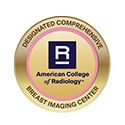
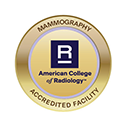
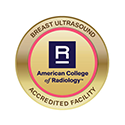
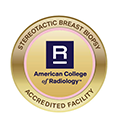
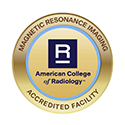
Accredited Breast Center
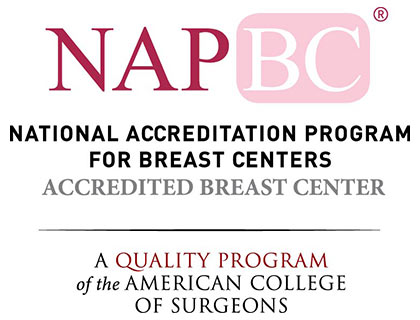
The National Accreditation Program fully accredits Portsmouth Regional Hospital for Breast Centers (NAPBC). This highly sought-after accreditation status elevates Portsmouth Regional Hospital’s breast program. This means that every person seeking and receiving care at our facility gets the best-in-class care from a team of physicians and nurses who have special training and skills in diseases of the breast -- both benign breast conditions and breast cancer alike.
Breast imaging services
The Breast Center at Portsmouth Regional Hospital offers a full range of breast imaging and related tests for the diagnosis and treatment of cancers in women, such as:
- Mammography
- Ultrasound
- Breast MRI
- Image-guided breast biopsies
- Breast density evaluations
Most women are in a low-risk category for breast cancer and an annual mammogram is sufficient for screening. Other women have an elevated lifetime risk (because of family history or personal medical history) and are best served by a combination of breast MRI and annual mammography. We do not simply perform mammograms—we educate patients about how they can avoid or fight breast cancer for themselves and their families.
Breast Imaging Center hours of operation:
- Monday: 7:00am to 5:30pm
- Tuesday: 7:00am to 4:30pm
- Wednesday: 7:30am to 6:00pm
- Thursday: 7:00am to 4:30pm
- Friday: 7:00am to 3:00pm
- Saturday: 7:00am to 11:30am — 2nd Saturday of the month, September through December only
Our walk-in Breast Clinic hours are Monday through Thursday, 2:00pm to 4:00pm.
Benefits of a 3D mammogram
We use 3D mammography as a way to detect breast abnormalities. Also known as digital mammography with tomosynthesis, 3D mammography is the latest technology in breast mammography. 3D mammograms examine your breast tissue layer by layer. So, instead of viewing all the breast tissue in a flat image, as with conventional 2D mammography, fine details are more visible and no longer hidden by the tissue above or below.
We recommend 3D mammography for patients who have:
- Previous mammograms with ambiguous or inconclusive results
- Dense breast tissue
- Been previously called back for repeat breast scans
- Breast cancer or have a family history of cancer
Depending on your insurance coverage, additional fees may apply for 3D mammography. You will be informed about any fees that are your responsibility when checking in for your appointment.
Schedule Screening Mammogram
You can now schedule a screening mammogram online. For assistance scheduling your screening or diagnostic mammogram please call 603-433-5191.
How to prepare for your mammogram
Screening exams last approximately 30 minutes. The Breast Center staff will provide personalized information about your results within 24 hours of your exam. Results will also be mailed to your home.
Diagnostic exams, however, last one to three hours. Images are reviewed at the time of your appointment by the radiologist who will provide you with your results before you leave.
To prepare for your mammogram:
- Please arrive 15 minutes prior to your appointment to allow for registration. You can also pre-register online.
- Be prepared to remove your top and bra. You will be provided a comfortable robe that will cover you from the hips up.
- Please do not wear jewelry, deodorant, powder or perfume. These substances can cause a shadow to appear on your images.
- Please bring your insurance card, physician referral (if required) and personal identification.
- If you have had a prior mammogram at another facility, please request a copy of your images to be sent to The Breast Center at Portsmouth Regional Hospital, or bring the disk with you to your appointment. It is important for the radiologist to compare prior images to your current images to determine if there have been any changes since your last mammogram.
What to expect during your mammogram
You will stand in front of a special X-ray machine, which has a platform for your breasts. One breast at a time will be lifted and placed between special plates that transmit the images. Each breast will be compressed when being analyzed, spreading and flattening the tissue for accurate results. To reduce discomfort, your technologist may provide you with a breast cushion.
At least two images of each breast are taken. For a primary image, you will face toward the platform. For a secondary image, you will stand beside the machine for a side view. Extra images may be needed if you have breast implants.
Breast self-exam
Healthcare professionals emphasize the value in conducting a regular breast self-exam to help identify breast cancer in its earlier stages. The American Cancer Society (ACS) recommends that women 20 years old and older conduct monthly breast self-exams.
Below is a guide for performing a breast self-exam:
- Perform your self-exam after your period starts, when your breasts are less likely to be sensitive or sore.
- Using a mirror, begin with your hands on your hips and look at your breasts to observe that they are their usual shape, size and color, are evenly shaped and without visible distortion or swelling. You should be looking for dimpling, puckering or bulging of the skin, nipple discharge or a change in the nipple's position, as well as redness, soreness, rash or swelling.
- Still in front of the mirror, raise your arms and look for the same observances as you did with your hands on your hips.
- While lying down, use your right hand to feel your left breast and left hand to feel your right breast. Using a firm, but smooth touch with the pad of your fingers, use a circular motion about the size of a quarter to feel all parts of each breast. Be sure to cover the entire breast from your collarbone to the top of your abdomen and from your armpit to your cleavage.
- Be sure to cover all the tissue, from the shallow parts of the breast to the deepest parts. Use light pressure for the skin and tissue just beneath the nipple and medium pressure for the tissue in the middle of the breast. Use firmer pressure for the deep tissue in the back—when you feel this part of the breast, you should be able to feel your rib cage.
- Finally, repeat the exam process while standing or sitting. Many women find it easiest to do this portion while the skin is wet, so you may choose to do this portion in the shower.
- If you come across any unusual findings—a lump, a tender spot that wasn't there last month, nipple discharge, change in coloring, change in size or anything similar, schedule an appointment with your doctor for an evaluation to determine if any imaging tests should be performed. It is important to also remember not to panic since breast tissue goes through many phases. A tender spot or change in size does not necessarily mean anything concerning.
Our breast health team
Our team of skilled and experienced breast health experts will answer your questions and provide accurate results in a timely and caring manner. The technologists work with your radiologist to complete all necessary screening and diagnostic procedures. If necessary, the breast imaging navigator will help you schedule breast imaging tests or a biopsy.
If you are diagnosed with breast cancer, the breast imaging navigator will connect you with a breast cancer nurse navigator who will work closely with you and your doctors. This team works together to offer the treatment, care, education and support you need.
Breast cancer can be surgically removed with a mastectomy procedure (your surgeon will remove all of your breast tissue) or a lumpectomy procedure (your surgeon will remove only part of your breast tissue). With a Hidden Scar® procedure, our fellowship-trained breast surgeon will place the incision in a location that is hard to see, so that the scar is not visible when your incision heals. As a result you have little to no visible reminder of the surgery or your cancer. This technique can be performed for a nipple sparing mastectomy or a lumpectomy procedure.

Our board-certified breast surgeon is trained in Hidden Scar® surgical techniques, and together, our goal is to give you the best surgical treatment and experience.
